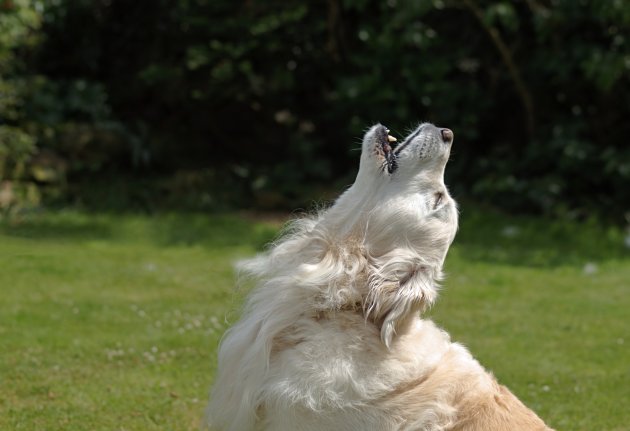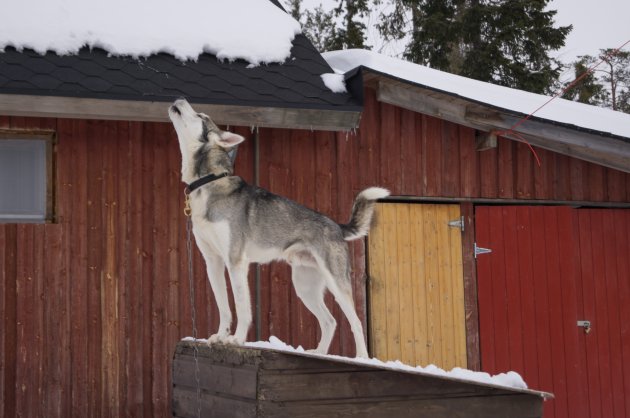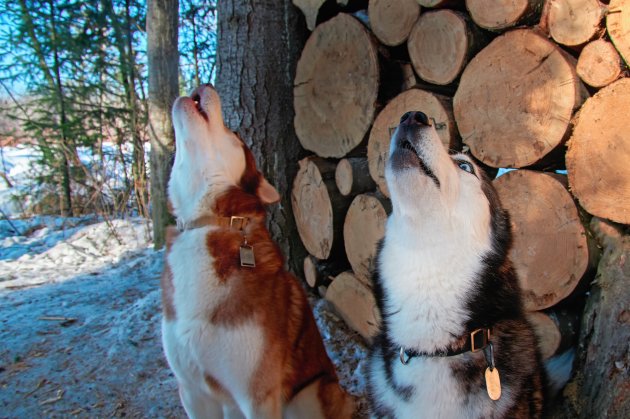All dogs howl, and it is one of the ways they communicate with one another and their owners. In the wild, feral dogs and wolfs howl to bring scouts and puppies back to the pack. Lost dogs also howl to give the position of their location.
Howling is widespread across all dog breeds and is their natural way to communicate different signals. As such, it shouldn’t be a concern, unless the dog howls excessively or frequently. From anxiety to sickness, bonding and threat alert, your furry friend will howl for a variety of reasons. Below, we take a look at six and how to prevent them.

Why Dogs Howl?
1. Need for attention
If your dog is reported to howl excessively while you are at work, it could be an expression of anxiety or other emotions. Like humans, dogs can be emotionally manipulative, especially when they want your attention. If your dog howls, then is suddenly happy and excited at your sight, it probably just wants some playtime with you. Sparing time to play with your dog can help reduce the howling. However, here are some more practical solutions:
- Ignore the attention-seeking howling
- Reward your dog with a treat for being silent
2. Separation anxiety
If your dog howls when you are at work, it may be experiencing separation anxiety, which is common among most dog breeds. This occurs when the dog is separated from its owner. The howling may also be accompanied by symptoms such as pacing, elimination, destruction, distress, boredom and depression. Dogs are friendly, playful creatures that tend to get bored, lonely and sad when left without company. They may howl to protest being left alone in the house. Here’s what to do:
- Get some toys and milk chews to keep your dog entertained while you are away
- Consider finding a reputable CAAB (certified applied animal behaviorist), Dip ACVB (board-certified veterinary behaviorist), or any CPDT (certified professional dog trainer) for expert help

3. Response to specific stimuli
Environmental triggers, such as the sound of an approaching ambulance, police siren, fire engine siren and other high pitched sounds, have been known to cause howling in dogs. Other dogs howling, fire, blasts, television show theme music and stereo music can also make your dog howl and wail.
If your dog is howling as a response to surrounding stimuli, it is usually for a short while until the provocation is no more. On the other hand, if the howling is persistent and frequent, here are some solutions to implement:
- Give your dog a treat or send them to fetch a toy when they start to howl
- Professional systematic desensitization and counterconditioning to desensitize the dog to triggers
4. Self-defense and boundary protection
Dogs will howl when other dogs or animals enter their space. In this case, they use howling to announce their presence and boundary and warn the other dog that space is occupied. It is also a self-defense mechanism to alert the owner about a predator or non-member.
The dog might howl when a new car pulls up in the driveway or when a stranger walks to the door. This is normal unless directed at every passerby, or the little creatures. In this case, try the following solutions:
- Take the dog back to the cage, ignore the howling and offer a treat when they finally stay quiet
- Close curtains to block the trigger or bring the dog into the house. Never leave them unsupervised

5. Injury and sickness
Dogs may howl to alert you to an injury or as a vocal embodiment of the pain they are suffering. Humans weep when they are physically hurt and dogs aren’t far behind. If anything, they will wail and howl for days, especially when ill, uncomfortable, or in pain.
For a dog owner, you should check for any immediate sign of injury, such as a cut, bruise, burn, thorn in the paw, broken legs or eye and nose irritation. If you can't find any physical sign of injury, consider the following:
- Take your dog to the vet for a checkup
- Find a dog painkiller to reduce the pain your dog is feeling
6. Discovery alert
All dogs will howl or bark when they see something strange, especially if they see it as a threat. Some dogs will howl while coming in your direction and then move back to where the danger is. Hunting dogs are also trained to howl and give up their position in case they discover, corner, or capture prey. Alerts for discoveries should last for a little bit until the stimuli is removed. Otherwise, if your dog won’t stop howling, you can use the following remedies:
- Ignore the howling until the dog is silent
- Reward them for remaining silent
Dog breed and howling
Science has it that all dogs are descendants from wolves, so they will howl from time to time. However, some breeds tend to sing more than others. Huskies, for instance, love to sing loudly and proudly to the moon, sirens, music and other stimuli.
If you have a pack of huskies, you can get a beautiful canine sound harmony as they will howl in unison. However, if you find this haunting or just too noisy, consider finding breeds that are less attracted to mass singing. You can also try various DIY desensitization and counterconditioning techniques using treats, rewards and toys.
Conclusion
Howling comes naturally to dogs to communicate and is thought to be for pack bonding reasons. This is why most dogs respond to howling like signals, such as sirens and high pitched music. Some dogs howl to join in on the fun while others do it when they are hurting or scared of something. So when is the right time to prevent your dog from howling?
Generally, if the howling is occasional, short-lived and justified, you shouldn't worry about the dog. However, excessive, persistent howling may signify deeper mental and health issues that require quick intervention. It depends on the cause of howling, which is the first thing you should identify before you think of a solution. You might need professional services from an experienced certified dog trainer.
Further reading and references:
- US National Library of Medicine. Marcello Siniscalchi, Serenella d’Ingeo, Michele Minunno, and Angelo Quaranta. Communication in Dogs
- U.S. National Park Service. Why Wolves Howl
- UCSB Science Line. Why do some dogs howl when they hear sirens?